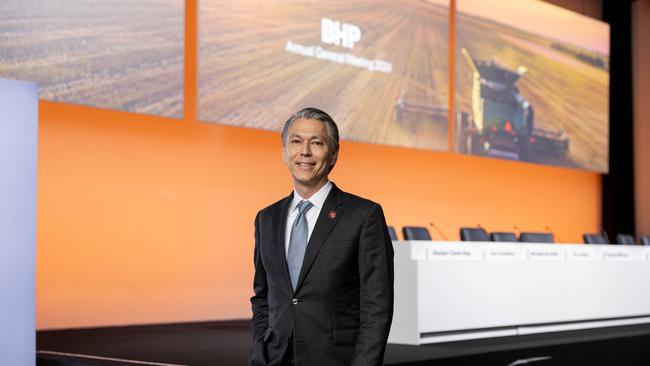Anglo strengthens buffer against BHP after fetching strong price for Aussie steel-making coal mines
Anglo American has sold its Australian coal mines for well above consensus estimates in a deal analysts say strengthens its hand against BHP.

Anglo American has strengthened its defences against any revised BHP takeover bid after gaining a higher than expected price for its Australian steelmaking-coal mines, as expectations grow that a buyout battle may re-emerge once a deal embargo ends this week.
The $US3.8bn ($5.8bn) coal deal with Peabody Energy adds strength to Anglo’s balance sheet as BHP ponders its next move after its $75bn takeover tilt was rebuffed in May.
BHP has left the door open to making a renewed bid once a standstill period under British takeover laws expires on November 29, but may bide its time as Anglo boss Duncan Wanblad tries to deliver on the rest of an ambitious restructure plan.
Anglo sold the Australian coal mines for well above consensus estimates of $US2.8bn in a deal analysts said would boost shareholder confidence in Mr Wanblad’s strategy to pare the London and Johannesburg-listed miner back to core copper, iron ore and crop nutrient assets.
“We see this as a positive event that will serve to reassure the market on management’s commitment to execute on the restructuring plan,” RBC Capital analyst Marina Calero said.
New York-listed Peabody said it could sell down stakes in the newly acquired mines or in its existing Australian assets as it unveiled a deal it expects to boost metallurgical coal production from about 7.4 million tonnes in 2024 to 21-22 million tonnes in 2026.
Peabody’s shares fell 5.2 per cent to $US25.99 after the deal was announced on Monday.
Mr Wanblad hailed the sale as an important step in the divestment strategy outlined in May, on the same day Anglo rejected a revised takeover bid from BHP.

BHP’s interest centres on the copper assets, but chief executive Mike Henry previously talked up synergies between the BHP and Anglo coal mines in Queensland’s Bowen Basin. Two of the coal mines sold by Anglo are almost next door to BHP’s BMA operations.
Peabody agreed to a cash consideration of up to $US3.8bn, including $US2.05bn at completion and a deferred cash consideration of $US725m, plus the potential for up to $US550m in a price-linked earn-out and a contingent cash consideration of $US450m linked to the reopening of the Grosvenor mine, closed after a fire in June.
The earn-out component is based on hard coking prices of more than $US240 a tonne in a deal that gives Peabody ownership of four mines – Grosvenor, Moranbah North, Aquila and Capcoal. Indonesia’s BUMA will take control of the Dawson mine.
The sale comes hot on the heels of Anglo raising $1.6bn from the sale of its stake in the Lake Vermont and Jellinbah coal mines in Queensland to billionaire Sam Chong.
The Peabody production forecasts are based on a much bigger contribution from the Moranbah North mine but do not include any tonnes from fire-damaged Grosvenor.
Peabody told analysts Grosvenor was one of the “crown jewels” in the acquisition, but said it was too soon to speculate when the mine might re-open or the costs involved.
Peabody Energy president and chief executive officer Jim Grech said Peabody’s experiences with its Centurion mine, formerly known as North Goonyella, and work with mine safety regulators in Queensland should help with Grosvenor.
North Goonyella was closed after a fire in 2018 and only reopened earlier this year. An investigation into the fire by Resources Safety and Health Queensland exposed shortcomings in health and safety procedures.
“We do feel that with our experience with the Centurion mine and working with the regulators at the Centurion mine, and the expertise that we’ve built up in bringing that mine back … what we’ve done to the mine to de-gas it, to make it a safer mine going forward, will be directly applicable to the Grosvenor mine,” Mr Grech said.
Peabody said initial assessments by Anglo indicated limited structural damage but it conceded a major re-set and new equipment would be required as it worked closely with safety inspectors on plans to re-open Grosvenor.
Mr Grech said Peabody was open to discussions on selling down stakes in the Anglo mines as it considered debt and equity options for the long-term financing of its first major acquisition in Australia since a near ruinous $4.9bn deal to buy for MacArthur Coal in 2011.
“We’d certainly take a look at potential minority stakes in any of those assets. The finances show that we don’t need to do that, but we are certainly very open to those discussions with not only these (Anglo) assets, but the Peabody assets and most notably the Centurion mine,” he said.
The final contenders for the Anglo mines included Yancoal and Stanmore Coal, with Peabody willing to pay up to become a major player in steelmaking coal. It is understood Glencore missed the short-list but remained interested in some of the operations.
Asked about Anglo and its assets earlier this month, Glencore boss Gary Nagle told The Australian he would buy the right mine but only at the right price.
“If someone wants to overspend and pay more than we think it’s worth, good luck to them,” he said.
Mr Wanblad’s restructure plans for Anglo include selling its nickel, diamonds and platinum businesses. He said on Monday that there had been strong interest in the nickel business.
Plans to sell the DeBeers diamond business have been hit by a market downturn, while the spin-off of the platinum division is scheduled to be complete by mid-2025.
Mr Henry fuelled speculation about a revised bid for Anglo with a recent visit to South Africa, where he reportedly met with the state-owned Public Investment, which has a 7.5 per cent stake.
BHP then back-pedalled on comments made by its chairman Ken McKenzie at the company’s AGM on October 31. The mining giant moved to ensure Mr McKenzie’s comments were not taken as market guidance after he told the meeting: “They (Anglo shareholders) moved on and quite frankly, so have we.”




To join the conversation, please log in. Don't have an account? Register
Join the conversation, you are commenting as Logout